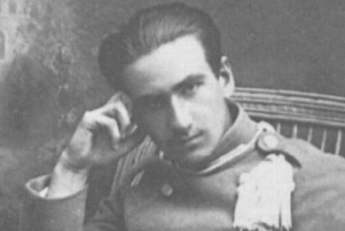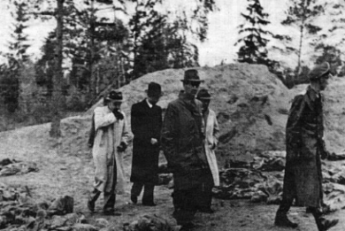
Lost in the war according to Józef Mackiewicz
War is definitely a negative phenomenon. Characteristic for it is the division of roles into enemies and friends, winners and losers. It is widely known that World War II was won by the Allies led by the Soviet Union, Great Britain and the USA. However, it is not as obvious as it is usually said – this is what Józef Mackiewicz, a staunch anti-communist, writer and publicist, tried to explain.
In history, Nazi Germany is the main force that started World War II in 1939. Hitler’s expansionist policy began with the violation of the provisions of the Treaty of Versailles. By entering Poland, the Barbarossa plan, unleashing war in Europe, declaring war on the United States, after almost six years of war, on May 8, 1945, the troops of the Third Reich capitulated.
Józef Mackiewicz noticed an unobvious element of the war – that Germany unintentionally helped communism. “The greatest popularizer of Bolshevism. . . all over Europe, became… Germany” – he indicated in the brochure “Optimism will not replace Poland for us” from October 1944. Where does such a strange conclusion come from? The Nazis integrate their narrative with anti-communism. The German anti-communist crusade carried an anti-Semitic narrative, a belief in the superiority of the Aryan race, which gave the Soviets an ideological advantage as those who fight against this injustice.
The fight against the Soviets was very risky, especially since there were many pro-Soviet activists in the ranks of the Polish Underground State. Mackiewicz, who was accused of pro-German activities, also had to pay for his anti-Soviet views, despite the fact that he absolutely did not collaborate with the Nazis, and even acted against them.
“The thing is that never in history have such millions of people waited for a war with such eagerness and expected so much from the war. Well, the degree of disappointment, caused by these Nazi beasts, is in people, as always in such cases, proportionally greater than the tension of previously placed hopes. The disappointment is devastating. This is no longer about the war, but about the post-war future. Disappointment, I predict, will grow into a desire for peace. And do you know where the world’s greatest peace reigns? In prison. (…) Well, this identification of ‘peace’ with ‘calm’ is to be feared. And all because of that son of a bitch Hitler, the moron with the mustache. He ruined the whole world. (…) Do you know who will win this war? Germany? England? Soviets? Americans? NO! The universal whore will win!” – wrote Mackiewicz in “No need to speak out loud”. In addition to the strong anti-Nazi narrative, the last words stand out the most, but especially the tone of the narrative, nervousness, even fury, powerlessness – are a perfect reflection of the general mood.
Mackiewicz noted that in the war people lost the most, no matter what side they were on. He also pointed out that not all criminals have been punished, because “what is a crime and what is not is not decided by the objective truth. The winning side will decide that.” To prove these words, it is enough to recall the Nuremberg trial, where the Soviets, instead of sitting in the dock, were judges.
“Did you guys hear that joke about how Stalin sent a squadron of bombers to Berlin? You will bomb, he told the pilots, military facilities, railway facilities, etc. Also, downtown. Some women and children will die in the process, what can you do, these are the demands of war. But if any of you bomb German propaganda, I will have them shot on the spot upon their return!” – this quote from Mackiewicz perfectly sums up that in war the most losing side is humanity.
Sources:
Józef Mackiewicz „Optymizm nie zastąpi nam Polski”
Józef Mackiewicz „Nie trzeba głośno mówić”
Bałżewska, K. (2013). Losers, Winners, and Their Crimes in the Context of the Themes of Józef Mackiewicz’s Selected Works. The Polish Review, 58(4), 71–79.
https://doi.org/10.5406/polishreview.58.4.0071






